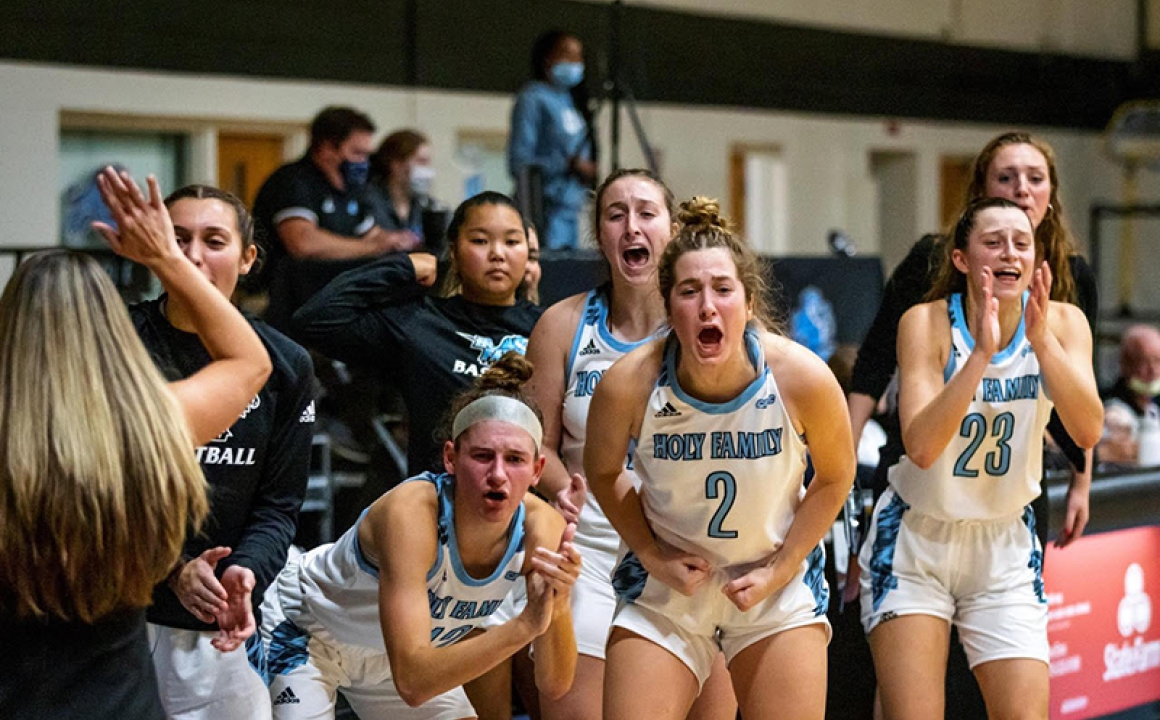The Transformative Effect of Collegiate Sports

The friendships forged. The life lessons learned. The knowledge gained. The competition and camaraderie of the campus experience. Few things can transform lives the way collegiate sports can.
For those fortunate enough to wear the uniform, compete at the highest level, and forever carry the memories of those competitions, the title of student-athlete is the predominant defining characteristic that resonates years after the student has run their last race, scored their last goal, or collected their last trophy. It is often the nexus that forever connects former student-athletes with their alma mater.
Consider the winning combination that collegiate sports provide – the opportunity to compete, and perhaps more importantly, to compete under the impassioned direction of coaches who instill life lessons. Coaches often serve as mentors, providing an additional level of support that enriches the overall experience of the student-athlete.
"Every time I get to see the relationships between my athletes grow tight is a defining moment for me as a coach," said men's lacrosse coach Noah Morris, who is guiding the program in its inaugural season. "It is gratifying seeing them all working hard together to reach a common goal."
How do you quantify the value of the often-intangible skills and attributes that result from involvement in college athletics? The leadership, teamwork, focus, heart, dedication in the face of adversity? The accountability, sportsmanship, the pursuit of a shared objective, the discipline and drive to be a champion, the chemistry and time management?
"I want my student-athletes to take away selflessness, hard work and respect from their time at Holy Family," head baseball coach Kyle Davis said. "I want them to care about the success of others over their own and to show respect to everyone they encounter."
A June 24, 2020 article by Jessica Harlan entitled "Lasting Benefits of College Sports for Student Athletes" used data from the National Collegiate Athletic Association (NCAA) and Gallup to actually quantify the transformational effect of intercollegiate athletics. The research revealed that former NCAA student-athletes who graduated from college between 1975 and 2019 were more likely to be "thriving" in four of the key five areas of wellbeing than nonathletes were. These included the purpose, social, community and physical domains. The two groups were equally likely to be thriving in the fifth element – financial.
The article outlined that Gallup's measurement of wellbeing is based on years of global and national research and included 10 questions that were asked of former student athletes and used to gauge wellbeing in five categories: Purpose Wellbeing: Liking what you do each day and being motivated to achieve your goals. Social Wellbeing: Having strong and supportive relationships and love in your life.
Financial Wellbeing: Effectively managing your economic life to reduce stress and increase security. Community Wellbeing: The sense of engagement you have, liking where you live, feeling safe and having pride in your community. Physical Wellbeing: Having good health and enough energy to get things done on a daily basis.
Though the data was collected prior to the COVID pandemic, the Gallup information in one key outcome (wellbeing) confirms that participation in NCAA athletics is related to long-term, positive impacts among former student-athletes, equally among both minority and white participants, and exceeds that of nonathletes.
"Being a collegiate athlete was and is a privilege that taught me that I can do anything I put my mind to," said Melissa Witner '03, a three-time All-CACC selection in soccer and a 2019 HFU Hall of Fame inductee who was a Rhodes Scholar nominee as a summa cum laude graduate in mathematics and is now a mother of three. "Most importantly, athletics taught me how to work together with other people. I learned how to lead by listening to those around me. I learned time management, and I learned to be grateful and to want to help others have the experiences I had."
The transformational effect of athletics also applies to the campus at large. In fact, intercollegiate athletics are often seen as "amenities" to university settings, quality additions that attract students from a larger geographic footprint and help to bolster an institution's image. Student-athletes are typically significant contributors to the vibrancy and diversity of their campuses. Beyond wins and losses, athletics provide a reason to rally, to showcase school spirit, and to stand and cheer and celebrate a sense of belonging. Perhaps, for this reason, collegiate sports should be viewed not as extracurricular, but rather co-curricular. Data also supports that winning athletic programs help to increase donations, applications, academic reputation, and enrollment numbers.
Indeed, sport, at its essence, and collegiate sports, by their nature, have the power to unite, inspire, and ultimately change, yes transform, the world. They are an essential fabric of the undergraduate experience, a source of pride and tradition, and a reason to be forever connected to a youthful confidence that allowed you once to swing for the fences and revel in the emotion of the game-winning shot. For the fortunate student-athlete, that feeling of satisfaction and accomplishment- when you have competed and succeeded - stays with you for life.
